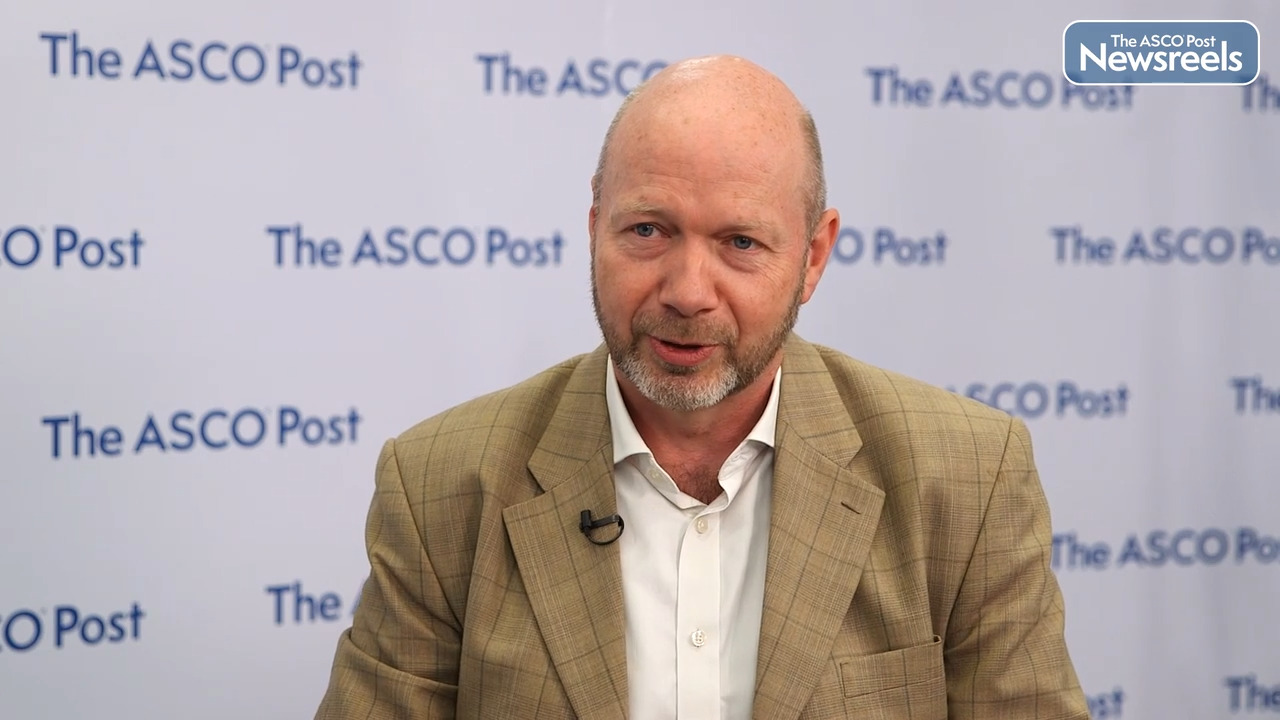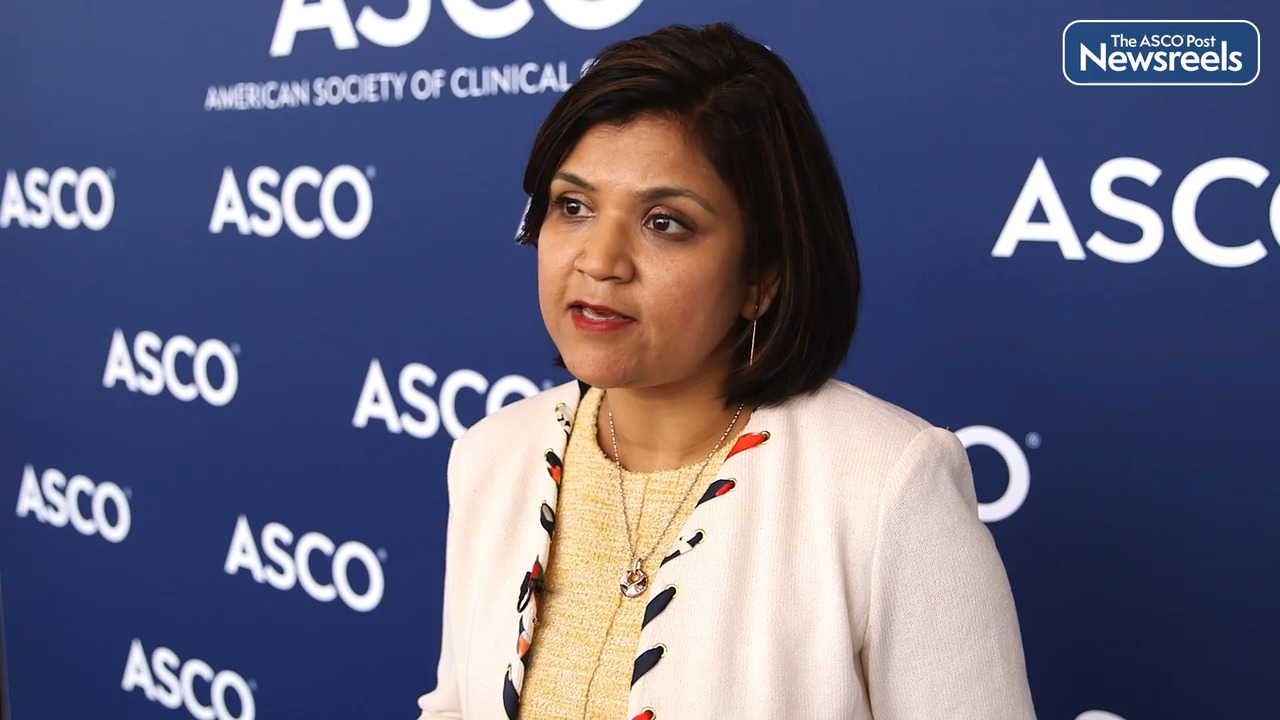Transcript
Disclaimer: This video transcript has not been proofread or edited and may contain errors.
Gilberto de Lima Lopes:
Hi Matt, welcome. Thanks for being here with us today. We are very excited to hear from you about the CHRYSALIS study, which you just presented at ASCO '22.
Matthew Krebs:
CHRYSALIS was a study looking at amivantamab, which was a bispecific antibody, that targets both EGFR and MET, and it could inhibit both of those receptors. And we previously had data for EGFR exon 20 insertion placements, in the EGFR setting, where it's FDA approved, post platinum. And we know this response rate of 40% duration of response, 11.1 months. But the antibody targets MET as well, so this cohort of CHRYSALIS was specifically to look at MET driven tumors.
Gilberto de Lima Lopes:
And the drug actually binds to MET with more affinity than it does with the GFR, correct?
Matthew Krebs:
Exactly right, yeah. If you look at the data, it can deplete the soluble MET, soluble free MET much more, at lower doses of amivantamab compared with the EGFR. So, really important that we establish whether this is effective in MET driven tumors.
Gilberto de Lima Lopes:
Absolutely. So that's why it makes sense to do the study in patients with MET exon 14 skip mutations. And what patients were eligible to enroll in this study?
Matthew Krebs:
Yeah. So MET exon 14 affects about 3% of non-small cell lung cancer patients, so the eligibility criteria were patients who had a confirmed MET exon 14 skipping alteration, had measurable disease. They could have come in at any treatment line, so it included some patients who were treatment naive, and some patients who had previous treatment.
Gilberto de Lima Lopes:
And did all patients have to have chemotherapy before? Or did you include patients who were completely naive?
Matthew Krebs:
Yeah, so not everyone. There were nine patients out of the 55 patients we've got recruited so far, who were totally treatment naive.
Gilberto de Lima Lopes:
Perfect. At the other end of the spectrum, you also had patients who had received TKIs that are active against MET exon 14, as well.
Matthew Krebs:
Yeah, exactly. So, we had some patients who were previously treated, just with chemotherapy, immunotherapy, and no prior MET inhibitor, and another group of patients who'd had chemo, IO, and also a prior MET inhibitor, as well.
Gilberto de Lima Lopes:
Fascinating, so what were the main findings?
Matthew Krebs:
So overall, looking at the whole cohort, the response rate was 33%, but if we looked according to prior treatments, those who were totally treatment naive had a overall response rate of 57%. And for those patients who were previously treated with chemotherapy, immunotherapy, but no prior MET inhibitor, the response rate was 47%. And for those patients who had a prior met TKI, the response rate was 17%.
Gilberto de Lima Lopes:
So interesting, we definitely have gradient between patients who had been exposed to treatments that are specific to MET before, but patients that did have TKIs, also had a pretty reasonable response rate.
Matthew Krebs:
Yeah, for sure. And the other thing that's interesting was the duration of response. So, there was a good duration of response, the median duration of response hasn't yet been reached, a lot of our patients are still ongoing on treatment, with at least 10 patients who've had control for six months or more.
Gilberto de Lima Lopes:
That's excellent. Any new signs, and how does the toxicity to this agent compare to the TKIs that target MET?
Matthew Krebs:
Sorry, I was just going to mention as well.
Gilberto de Lima Lopes:
Absolutely.
Matthew Krebs:
For your previous question. For those patients, who'd had a prior MET inhibitor, and the response rate was just 17%, actually the duration of benefit was quite long, so even those patients with stable disease, it was quite prolonged, so we still think there's some activity there, and I think important we look at some predicted biomarkers for that we could come back to later.
Gilberto de Lima Lopes:
Brilliant. Back to the question about toxicity, any new signs, and how does that compare to the toxicity issue with the TKIs?
Matthew Krebs:
So, no new safety signals in this particular cohort. Most adverse events, grade one to two, very much fit with adverse events we've seen with a larger CHRYSALIS cohort. And toxicity is in keeping with both EGFR and MET inhibition. So for EGFR, rash, dermatitis, paronychia. And for the MET, the low albumin and the peripheral edema.
Gilberto de Lima Lopes:
Definitely manageable as we've gotten used to use these drugs. And what are your conclusions about this study, and how do we move forward from here?
Matthew Krebs:
So, I think we've clearly shown that amivantamab does have activity now in MET driven tumors, as well as EGFR, so we've shown that principle, we know it binds to both receptors. And now shown we have clinical activity, both in EDFR exon 20 disease, and now in MET driven disease as well. The cohort's still recruiting, so we've got 55 patients recruited so far, we're aiming up to 100, and those datas still needs to mature, in terms of duration of response and progression free survival. And it'd be interesting to see how things pan out, both for the treatment naive groups, and for those who've had prior treatment, and prior TKIs.
Matthew Krebs:
I think for the future, I think important we look, if there's any predicted biomarkers, for those who've had prior MET inhibitors, is there something we can pick out from the translational analyses, that might suggest they're more likely to benefit. And people have spoken about, "Could combinations be helpful for this setting?", I'm not sure. I think for the MET exon 14s, I think trying to combine amivantamab with a tyrosine kinase inhibitor, could potentially be quite toxic.
Matthew Krebs:
So at the moment no plans for combinations in that specific patient group, but there are of course combinations in the EGFR setting, both for exon 20 insertion, and for those patients, who've got sensitizing EGFR mutations, and progressing on prior TKIs in that setting.
Gilberto de Lima Lopes:
Looking forward to see how we continue to develop MET inhibitors, and combinations with EGFR, and other potential agents. Thank you so much for being here with us today, and looking forward to staying in touch.
Matthew Krebs:
Thanks for having me.
Gilberto de Lima Lopes:
Very nice seeing you. Thank you.





